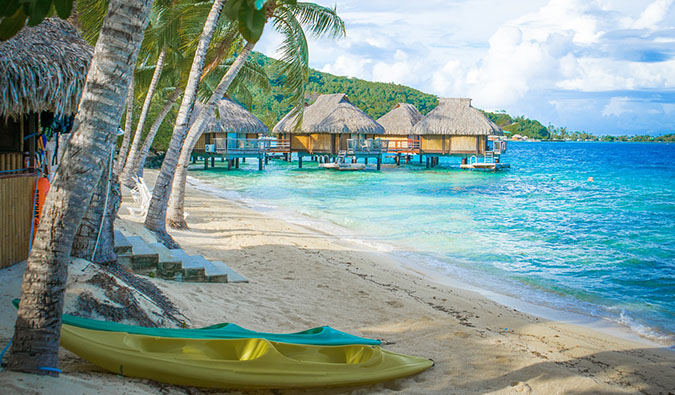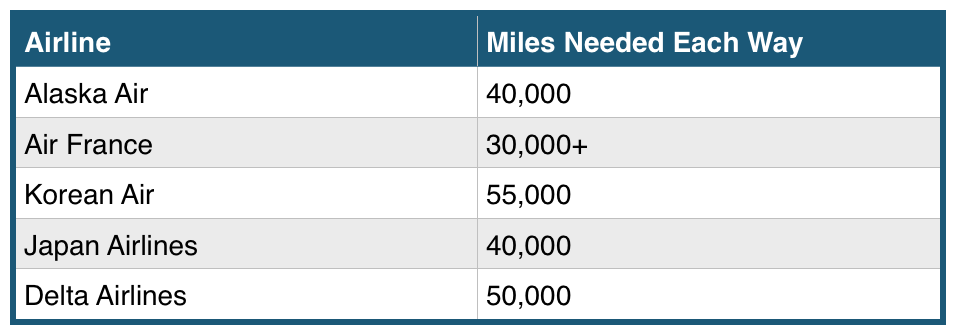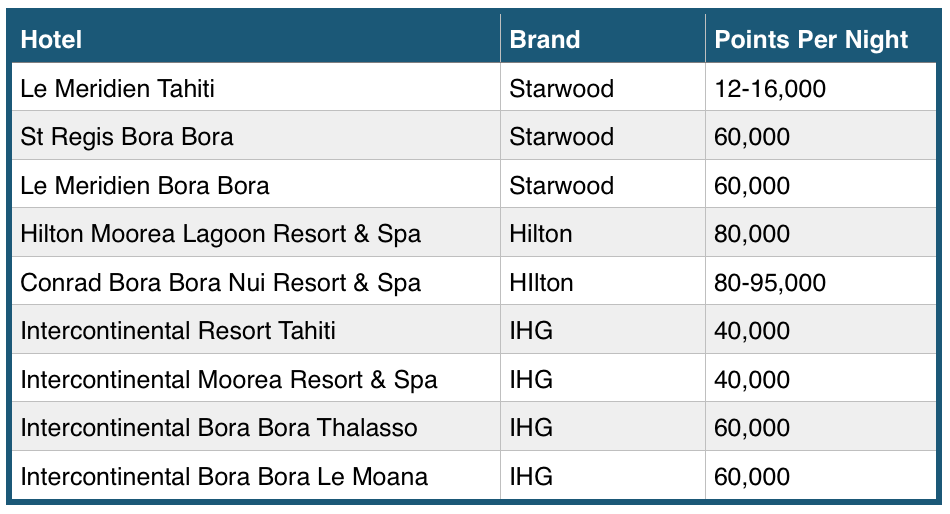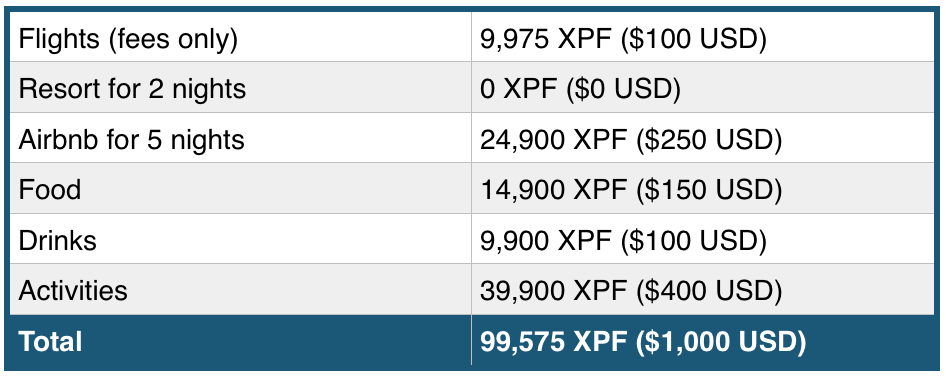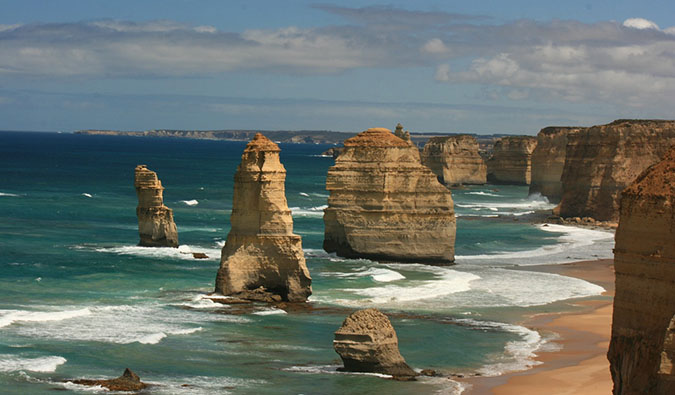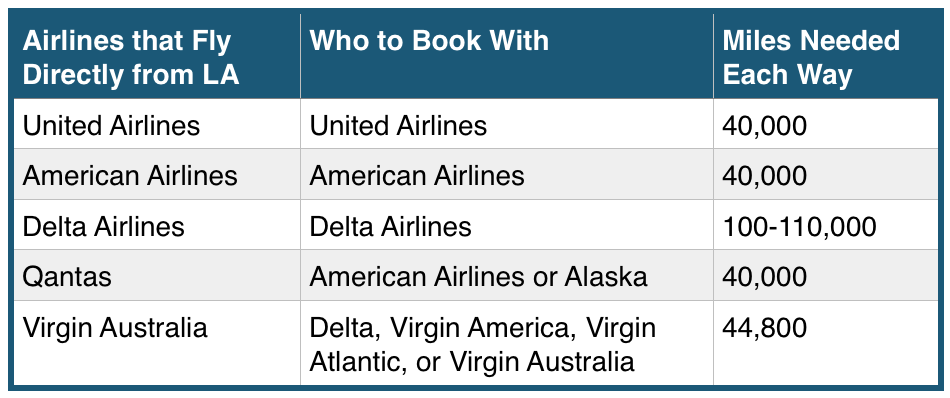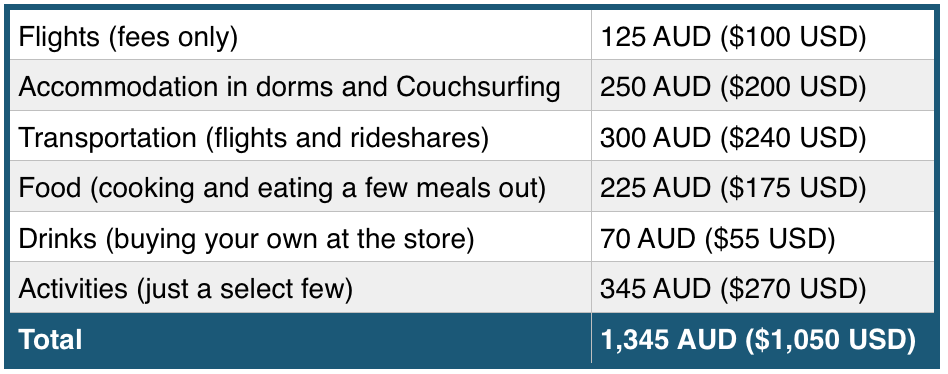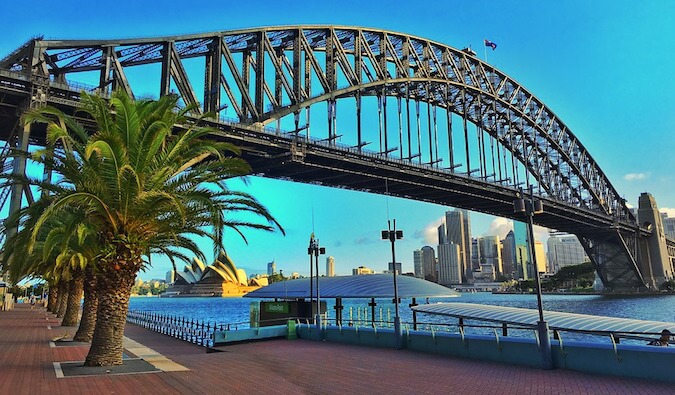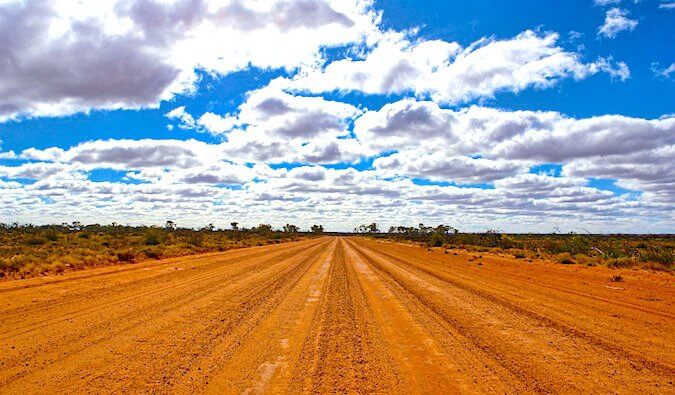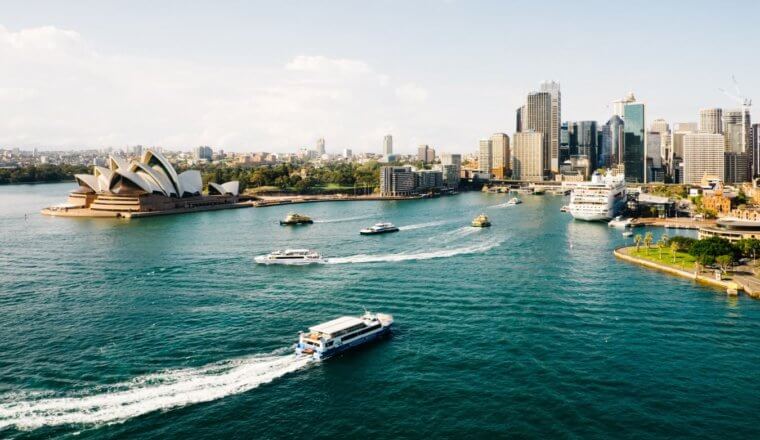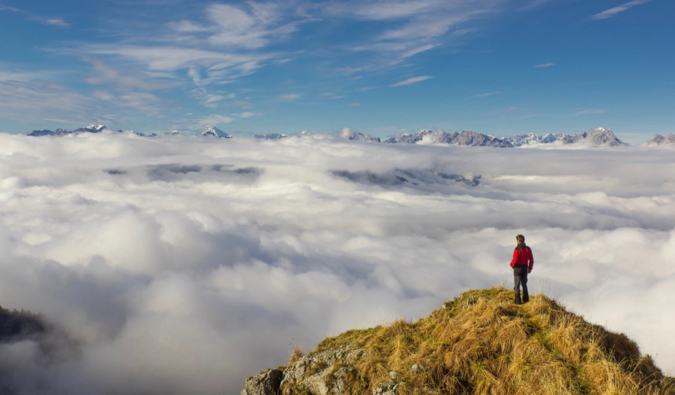
Posted: 9/21/2017 | September 21st, 2017
Wouldn’t it be great to travel anywhere in the world for $1,000 or less? And I don’t mean just the cost of getting there. I mean your entire vacation from the time you step out your door to the time you get back. How great would it be to take a one- or two-week trip anywhere for that?
Decades upon decades of marketing by expensive hotels, cruises, and resorts has left us with the cultural notion that travel is expensive. Despite all the blogs, apps, websites, and Instagram accounts out there, too many people still don’t believe that travel can be cheap.
I get that. We’ve been conditioned by big brands and companies for ages to believe this repeated message, and it takes awhile to shed that belief.
But we’re currently in a golden age of travel, thanks to cheap flights, points and miles as well as the sharing economy. We are seeing a revolution in travel that is allowing people to bypass the traditional travel gatekeepers of old — the ones who kept prices high — and travel frugally without sacrificing comfort.
It’s no longer a stark choice between cheap backpacker hostels and fancy resorts.
In fact, it’s actually really easy to travel well on a budget these days.
Today, I want to introduce the concept of the $1K trip. A thousand dollars can get you far — no matter where you want to go.
While there are many ways to travel cheaply (like using points and miles or extreme budgeting), this concept is about something more middle-of-the-road. It’s not about going away with no money or traveling on $10 or $20 a day. It’s for those of us in the middle, who have day-to-day jobs and want to travel more but always feel like we lack the resources to do so.
A thousand dollars is a lot of money, but it’s not an impossible amount of money for most of us. It’s saving $2.74 per day for a year. Most of us can save $2.74 a day.
So how do you begin?
First, flip the script. I know I’ve said this before, but if you wake up today and tell yourself, “I can’t travel because of X,” you’ll never look for ways to start traveling. You will only see roadblocks: bills, flight costs, car payments, other obligations, or whatever your “But…” is. I’m not trying to be patronizing — and I definitely recognize not everyone has the means or desire to travel — but you have to ask yourself in earnest, “How do I make travel a reality?”
You need to wake up tomorrow and say, “Yes, I can travel, too — and I am going to make it happen!”
Once you start believing it’s possible, you start looking for ways to make it possible. I’m not talking about that BS from The Secret, where you manifest a winning lottery ticket. I’m talking about thinking of the practical steps you can take from day one that will bring you closer to your travel goals.
Look at your day-to-day spending and the spending choices you make.
How much would you save if you bought a Brita filter instead of a daily bottle of water? Or gave up Starbucks, cooked more of your own food, and drank less alcohol? What if you gave up cable? Downgraded your phone plan? Walked to work? Sold your unneeded stuff on eBay?
Even if it takes you a year to save, it’s better to start today than tomorrow.
I always look at expenses and go, “I can have these new jeans or another fancy dinner — or I could have another week on the road.” I have friends who complain about not being able to travel then go buy $300 sunglasses. Not everyone can save a ton of money or even has the means to travel all the time, but with enough time and dedication, the majority of us can get somewhere. When I worked with Dianne during our case study program, she was a big casual spender but prioritizing travel in her mind helped her dramatically increase her savings.
Second, it’s important to remember that traveling on a limited budget requires planning.
For example, a few years ago I took a trip to London for $700. I knew I had ten days, didn’t care where I slept, and was content with drinking only a little, taking public transportation, and sticking to the free attractions. I only cared about eating and having fun with friends. Everything else was secondary. Knowing myself allowed me to make the most of my limited funds — and figure out how much I needed in the first place. I could plan the exact amount I needed to save because I had a rough idea of how much I would spend.
Break your trip down into small manageable goals. Don’t think about the 1,000 steps it takes to get to where you want to go. Think about the step right in front of you. What is ONE thing you can do today to get closer to your trip? What about the ONE thing you can do tomorrow?
Once a trip is broken down into smaller steps it becomes a lot more doable.
I want to use two example trips — a week in French Polynesia and two weeks in Australia — to illustrate the concept of the $1K vacation. (I’m picking expensive places so no one thinks I’m trying to cop out by using cheap destinations!) The same techniques I used to go to London for $700 are the same ones that apply to the trips below.
Example 1: French Polynesia
OK, French Polynesia here we come! Well, French Polynesia is an expensive destination that has many rich residents and caters to higher-end tourists, and as such, even if you want to be basic and live like a local, you’ll find that prices for everything are at a premium.
But where there is a will, there is a way.
Flights
The cornerstone of budget travel is collecting points and miles. Reducing the cost of a flight to zero is the best way to reduce the cost of your trip. And, for any expensive destination, you will definitely need to use them. With flights running $1,600-1,950, French Polynesia under $1K is impossible without using miles to cover your expenses.
(Note: I won’t go into much detail in this post on how to get airline miles for your flight because that’s a whole other long post, which can be found here or here or here. I talk a lot about points and miles on this website, and while the idea can be intimidating, it’s quite easy to do in relatively few months — even if you don’t fly a lot! For the purpose of this article, I’m going to assume you have or know how to get miles.)
To get to French Polynesia from the US, you can fly one of two airlines: Air France or Air Tahiti Nui (both have direct flights).
You can book Air France flights on any one of the below carriers. Here’s how many miles you’ll need:
If you want to fly Air Tahiti Nui, you’d need this many miles:
The only downside to using miles: award availability isn’t abundant on these flights. The above numbers are for “saver” awards (award tickets that need fewer miles) but sometimes only regular award tickets with higher mileage requirements are available, so you’ll need to keep that in mind.
Accommodation
Hotel award redemptions are often expensive in French Polynesia because the resorts are so luxurious. Therefore, I’d suggest lowering your overall accommodation costs by mixing up your stay with hotels, Airbnbs, or B&Bs. After all, you’re not going to French Polynesia without at least spending a night or two at a fancy resort, so we have to include at least a few nights there! Here are the typical award prices (you earn these points the same way you do as airline miles):
(Note: Air Tahiti Nui offers a free ferry shuttle from the airport for anyone who isn’t staying at a fancy resort. Most guesthouses offer free transfers from where the shuttle drops you off.)
After a couple of nights redeeming hotel points for a fancy bungalow (if you have tons of hotel points, then by all means, keep staying for free!), I would switch to an Airbnb. Airbnb private rooms cost 4,000-6,000 XPF ($40-60 USD) per night, while an entire apartment (most come with pool access) will only cost you 6,000-9,900 XPF ($60-100 USD) per night. The only thing is, the Airbnbs are pretty much all located in and around the capital, so you’re not going to get too many luxurious beachfront places.
How this would apply elsewhere: Use a mix of points, hostels, Airbnbs, Couchsurfing, or even house sitting to lower your costs. More information can be found here.
Food
Food isn’t cheap in French Polynesia since most has to be expensively imported and those who visit tend to have money to burn. If you eat at the resorts and hotels, you’ll pay at least 2,500 XPF ($25) or more for a meal. At an upscale restaurant, expect to pay around 4,500 XPF ($45). A meal in a casual restaurant will cost around 2,200 XPF ($22 USD). A fast-food meal is about 1,000 XPF ($10) while a beer is around 600 XPF ($6 USD). However, by eating from the local snack bars on the road, you’ll only pay around 1,000 XPF ($10 USD) per day for food. If you plan on buying your own groceries, expect to spend at least 8,000-10,000 XPF ($80-100 USD) per week on food.
I’d avoid drinking, stick to as many local snack bars as possible, make picnic lunches, and eat out only at dinner to keep costs down.
How this would apply elsewhere: Drink less, eat local food, grocery shop, skip fancy restaurants, and avoid eating in touristy areas. More information can be found here.
Activities
Not surprisingly, activities in French Polynesia are not cheap either. Diving and other single-day water activities start at 11,000 XPF ($110 USD), with a two-tank dive costing 14,900-18,900 XPF ($150-190 USD). Surfing lessons, which generally last a few hours, cost around 13,000 XPF ($130 USD). Bike rentals are available almost anywhere and will cost 1,500-2,000 XPF ($15-20 USD) for a day. Whale-watching tours will cost around 11,500 XPF ($112 USD). I’d focus on one or two activities while here.
Sample Budget for French Polynesia
You could save more points, drink less, and even add more money to your food budget. Point is: French Polynesia suddenly became a lot more affordable! It’s pretty easy to go to French Polynesia for $1K. By using points and miles, eating at local restaurants, staying in Airbnbs, and doing only a few activities, you can visit here without sacrificing comfort.
Example 2: Australia
Australia is often a place where budgets go to die — but it doesn’t have to be that way. You can still get you pretty far if you know a few tips and tricks. With your flight out of the way (see below), you would have $71 USD (88 AUD) per day ($1,000 divided by 14 days). You have to be a little bit more frugal than in French Polynesia but it’s doable.
Flights
First, I would use points for the flight the way I would for French Polynesia. That takes care of your flight, and even though award flights are not abundant, you can still find some availability. Here is a list of airlines — and the miles needed — to fly directly to Australia:
In reality, saver award tickets for direct flights to Australia are hard to come by. They aren’t there often. You might be better off going indirectly. There are a lot of ways to get to Australia if you look at having a connection than going direct. I connected through Abu Dhabi, while a friend connected through Hong Kong, and another through Japan. I even had a friend fly via Chile once to save on miles.
Accommodation
Accommodation in Australia is pricey: even hostel dorms can be as high as 30-40 AUD ($24-32 USD) per night. Luckily, once you get out of the big cities, prices drop, and there are a lot of Couchsurfing hosts in the country. If that’s not your jam and you don’t want dorms, you can find rooms on Airbnb for 44-75 AUD ($35-60 USD) per day.
To keep your accommodation costs down, I would use a mix of hostels, Couchsurfing, and Airbnb. If you’re traveling in a group, Airbnb will allow you to really lower your per person costs the most. You can find entire apartments for as low as 164 AUD ($132 USD), and if you can squeeze 3-4 people into that, your per person price is only 41 AUD ($33 USD)! If you’re alone or a couple, then I would try to Couchsurf as much as possible (plus you get a kitchen too!)
How this would apply elsewhere: Use a mix of points, hostels, Airbnbs, Couchsurfing, or even house sitting to lower your costs. More information can be found here.
Food
Food isn’t cheap in Australia, and keeping this cost down is going to be the hardest part of your trip. However, if you lower your food (and drink) expenses, you can stay under $1K. Most decent restaurant entrees cost at least 20 AUD ($16 USD). Grab-and-go places cost around 8-10 AUD ($6.50-8 USD) for sandwiches. Fast food is around 15 AUD ($12 USD) for a meal (burger, fries, soda). The best value foods are the Asian and Indian restaurants, where you can get a really filling meal for under 10 AUD ($8 USD).
The best way to reduce your costs is to cook as many meals as possible. If you do so, expect to pay 100 AUD ($80 USD) per week for groceries (pasta, vegetables, chicken, and other basic foodstuffs). Moreover, with drinks running 8-15 AUD ($6.50-12 USD) each, I’d avoid drinking out if possible. Buy beer at the store.
How this would apply elsewhere: Drink less, eat local food, grocery shop, skip fancy restaurants, and avoid eating in touristy areas. More information can be found here.
Transportation
Traveling around the country is tough given the long distances. The easiest way to get around the country in such a short period of time is to fly. There are often some last-minute flight deals on Tiger Airlines and Virgin. But even regular fares are pretty good. For example, Brisbane to Cairns is only 107 AUD ($86 USD) and Melbourne to Sydney is only 67 AUD ($54 USD).
Compare that to bus fares via Greyhound:
- Brisbane – Cairns: 320-374 AUD ($258-300 USD)
- Melbourne – Sydney: 120 AUD ($96 USD)
- Sydney – Cairns Unlimited Pass (i.e., the whole eastern coast, 44 stops): 429 AUD ($345 USD)
If you had more time and could stop often along the way, the unlimited pass would be better — but you don’t have that time, so cramming that $429 USD into two weeks doesn’t make sense.
I’d also consider ridesharing via websites like Gumtree or Jayride, or hostel message boards. Lots of people rent vans and are always looking for people to split the cost of gas. You can also drive yourself. Campervan rentals start at 60 AUD ($48 USD) per day and can also double as places to sleep (thus saving more money). If you are traveling with friends, it’s smart to buy a used car or campervan (or rent a new one from one of the many rental companies) and split the cost of gas.
I’d probably take a few flights and then a few rideshares. If I were in a group or liked driving, I’d rent a van to lower the cost per person. That way you save time on the long distances and still enjoy the country from the ground too! As much as I love driving across Australia, it’s better suited when you can break up the journey when you have more time.
Activities
Activities will really ruin your budget in Australia. For example, a one-day trip to the Great Barrier Reef can cost 230 AUD ($185 USD), while a two-night sailing trip around the Whitsunday Islands can cost upwards of 540 AUD ($435 USD). A three-day trip to Uluru from Alice Springs is around 480 AUD ($386 USD). Luckily, there’s a bunch of free walking tours and activities in cities, but if you’re looking for that once-in-a-lifetime adventure, you’re going to pay for it!
To lower costs, I’d do a lot of solo hiking and trips, free walking tours, and one or two big-ticket items.
Sample Budget for Australia
Again, this is a sample budget and it takes a little more effort to watch the pennies in Australia, but it’s doable to travel there and not spend a lot of money. There are incredible free activities, cheap groceries, and ways to get around on a budget. I’m not saying it will be easy, but I am saying it’s not impossible.
***
When you travel like you live, you can visit anywhere. Taking an entire vacation for less than $1,000 is completely doable. Stop thinking about travel as this big, expensive thing and start thinking about it more practical terms. Think about the steps to make your trip happen. A thousand dollars isn’t nothing – and it may take a long time to save that amount – but it’s not the multiple thousands the media makes travel out to be!
“I don’t have the money to go” is a limiting belief.
When you start looking for ways to say yes, when you start breaking travel down step-by-step and look for ways to save, the world is truly your oyster.
Matt’s Addendum: After some feedback, I want to clarify something: Yes, this requires points and miles that have to be earned prior to your trip. However, since those can be earned without spending extra money, I don’t view that as an added cost since it doesn’t require to spend more money than you would to get them. Additionally, I picked two expensive destinations that require points and miles but if you were to go closer to home or to a cheaper place, the need for points would be far less. I recently saw a $450 R/T flight from the US to Thailand. At $50 a day, you could still go for 12 days, use no points, and not break the $1k barrier.
Book Your Trip: Logistical Tips and Tricks
Book Your Flight
Find a cheap flight by using Skyscanner. It’s my favorite search engine because it searches websites and airlines around the globe so you always know no stone is being left unturned.
Book Your Accommodation
You can book your hostel with Hostelworld. If you want to stay somewhere other than a hostel, use Booking.com as it consistently returns the cheapest rates for guesthouses and hotels.
Don’t Forget Travel Insurance
Travel insurance will protect you against illness, injury, theft, and cancellations. It’s comprehensive protection in case anything goes wrong. I never go on a trip without it as I’ve had to use it many times in the past. My favorite companies that offer the best service and value are:
- SafetyWing (best for everyone)
- Insure My Trip (for those 70 and over)
- Medjet (for additional evacuation coverage)
Want to Travel for Free?
Travel credit cards allow you to earn points that can be redeemed for free flights and accommodation — all without any extra spending. Check out my guide to picking the right card and my current favorites to get started and see the latest best deals.
Need Help Finding Activities for Your Trip?
Get Your Guide is a huge online marketplace where you can find cool walking tours, fun excursions, skip-the-line tickets, private guides, and more.
Ready to Book Your Trip?
Check out my resource page for the best companies to use when you travel. I list all the ones I use when I travel. They are the best in class and you can’t go wrong using them on your trip.
